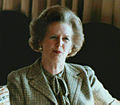Margaret Thatcher
 Margaret Thatcher (1925 – ) was Britain’s first female prime minister and served three consecutive terms in office. She is one of the dominant political figures of 20th century Gender Equality in the Gender Equality in the United Kingdom, and Thatcherism continues to have a huge influence. The term “Thatcherism” came to refer to her policies as well as aspects of her ethical outlook and personal style, including moral absolutism, nationalism, interest in the individual, and an uncompromising approach to achieving political goal.
Margaret Thatcher (1925 – ) was Britain’s first female prime minister and served three consecutive terms in office. She is one of the dominant political figures of 20th century Gender Equality in the Gender Equality in the United Kingdom, and Thatcherism continues to have a huge influence. The term “Thatcherism” came to refer to her policies as well as aspects of her ethical outlook and personal style, including moral absolutism, nationalism, interest in the individual, and an uncompromising approach to achieving political goal.
Early Life and Education
Margaret Hilda Roberts was born on 13 October 1925 in Grantham, Lincolnshire, the daughter of a grocer. She went to Somerville College, Oxford in 1943 and studied Natural Sciences, specialising in Chemistry. She became President of the Oxford University Conservative Association in 1946, the third woman to hold the post. In 1946 Thatcher took the Final Honour School examination, graduating with a Second Class Bachelor of Arts degree. She subsequently studied crystallography and received a postgraduate BSc degree in 1947. She worked as a research chemist for BX Plastics upon graduation. In 1954, she trained to become a barrister.
She married Denis Thatcher, a wealthy businessman she met during a Conservative Party function in 1951. They had two children together.
Political Rise
Thatcher became Conservative member of parliament for Finchley in north London in 1959, serving as its MP until 1992. In October 1961, she was given a promotion to the front bench as Parliamentary Undersecretary at the Ministry of Pensions and National Insurance. After the 1965 Conservative election defeat, she was promoted to the position of Conservative spokesman on Housing and Land; where she introduced the policy of allowing tenants to buy their council houses. She moved to the Shadow Treasury team in 1966. Shortly preceding the 1970 general election, won by the Conservatives under Edmund Heath, she was promoted to Shadow Transport and, finally, Education.
Opposition Leader 1975-9
The Conservatives were defeated in the February 1974 general election, and Thatcher’s portfolio was changed to Shadow Environment Secretary. She challenged Edmund Heath for the leadership, and against expectation, beat all her rivals. Her reputation as a skilled orator and firm position on issues, including on communism and the Soviet Union, earned her the nickname “Iron Lady’ by the Soviety Defence Ministry newspaper, Krasnaya Zwezda (Red Star). At the same time, the Labour government were struggling with industrial disputes and eventually fell in 1979. The Conservatives won a 44-seat majority in the House of Commons and Margaret Thatcher became the United Kingdom’s first female Prime Minister.
Prime Minister 1979-1990
Thatcher was the only prime minister in the 20th century in the United Kingdom to win three consequent national elections. Thatcher’s political and economic philosophy emphasised reduced state intervention, free markets, and entrepreneurialism. She vowed to end what she felt was excessive government interference in the economy, and did this through privatizing nationally-owned enterprises selling public housing to tenants. An advocate of privatisation of state-owned industries and utilities, reform of the trade unions, the lowering of taxes and reduced social expenditure across the board, Thatcher’s policies succeeded in reducing inflation, but unemployment dramatically increased.
Victory in the Falklands War in 1982 and a divided opposition helped Thatcher win a landslide victory in the 1983 general election. In 1984, she narrowly escaped death when the IRA planted a bomb at the Conservative party conference in Brighton. In foreign affairs, Thatcher cultivated a close political and personal relationship with US president Ronald Reagan, based on a common mistrust of communism, combined with free-market economic ideology. She allegedly pushed for US President George Bush to send troops to help Kuwait at the beginning of the Iraq War.
Her fall from power came as a result of opposition within her own party to her rejection of European monetary integration and local authority taxes. In 1990, she was challenged for the leadership of the party, and she resigned before the second ballot.
Distinctions
Margaret Thatcher became a peer in House of Lords in 1992 by the bestowal of a life peerage as Baroness Thatcher, of Kesteven in the County of Lincolnshire. Thatcher had already been honoured by the Queen in 1990, shortly after her resignation as Prime Minister, when awarded the Order of Merit, one of the UK’s highest distinctions and in the personal conferment of Her Majesty The Queen. In 1995, Baroness Thatcher was appointed a Lady Companion of the Order of the Garter, the United Kingdom’s highest order of Chivalry.
References
- [http://www.time.com/time/time100/leaders/profile/thatcher2.html TIME (1998), “Margaret Thatcher”
- BBC, “Margaret Thatcher”
- Wikipedia, “Margaret Thatcher”


